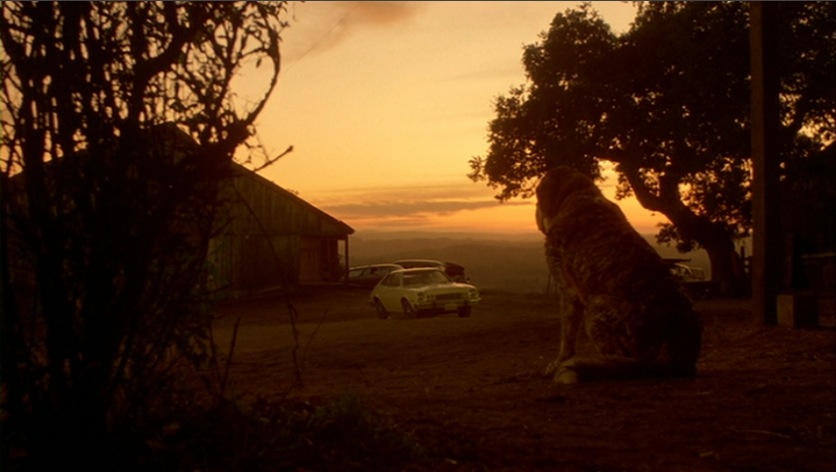
Marriage Counseling by Monster
This is part 3 in the series, The Decade Long Stephen King Cinematic Orgy. Part 1, with an introduction is here, and part 2 is here. Spoilers ahead.
The beauty of a Stephen King film is that even when the source material has been repackaged twice—once by a screenwriter, and then again by a director—it still maintains tremendous emotional depth. Each of King's novels work as a character study, independent of the horror elements; so even when much must be stripped away, the heart of the story, that is the characters and their struggles, remains in full.
Perhaps no where is this fact better illustrated than in the 1983 adaptation of "Cujo." Directed by Lewis Teague, "Cujo" is likely remembered, if it is remembered at all, as a movie about a St. Bernard gone berserk. Based upon King's seventh major novel, published in 1981, "Cujo" really tells the story of two families under great duress. Comparing plot summaries, one finds that the film's screenplay hews pretty closely to King's original story so for the purposes of this essay I'll be writing as if they are identical. In reality, as I hinted at above, while the plot points may align, the novel contains far more depth of character as well as greater insight into what has caused this beast to go off the deep end.
The two families at the center of this film, the Trentons and the Cambers, are a lot alike. Each has only one son. Each suffers from poor lines of communication. And each wife hides a secret. Otherwise, the Trentons, members of the upper crust in their small town, and the Cambers, who occupy one of the lowest rungs on the social ladder, couldn't be more different. It's clear from the early going that things in neither family are as they appear, a thread common to many King stories. Underneath the thinnest of covers, both units are headed for disaster: a situation into which steps a force of nature to set things right.
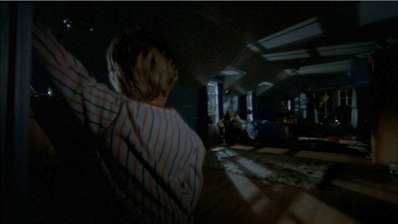
Both families share screen time, but it is really the Trenton's that we are asked to identify with. The adorable Tad, we're shown very early on, is afraid of monsters. Teague, the director, does well to establish Tad's POV from the outset as one lens through which we will experience action. In Tad's world, monsters are a very real concern, and it's interesting that in the early sequence showing Trenton family life, it is dad that comes to check on things when Tad freaks out.
Monsters' existence, or lack thereof, is a hot topic for the Trenton's these days, and in the morning dad and Tad have a heart to heart where dad explains, "There's no such things as real monsters." Tad, ever ready with a witty rejoinder, quips: "Not in the day time anyway!" Anyone who has seen the film's cover art, poster, or even opening credits, will realize that this is some heavy foreshadowing, but in the context of the family dynamic it never feels forced or unnatural.
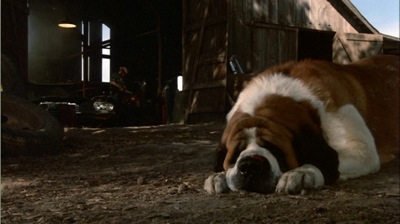
Lest anyone think that there isn't a real monster in this film, I should point out that I've skipped over the real opening sequence thus far. "Cujo's" first few minutes actually play more like a preface wherein a lovable, and quite massive, St. Bernard chases a rabbit into a rabbit hole. There's some bats, and one of the bats bites the huggable Cujo, and for the next forty-five minutes, all we really see of the dog is a festering—and presumably rabid—sore on his nose.
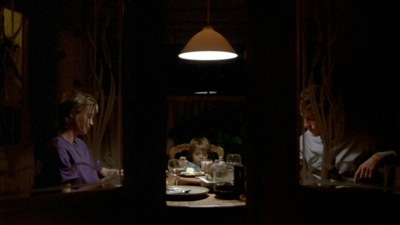
All this downtime for Cujo allows Teague to establish the issues plaguing both families. For see, Donna (Mrs. Trenton) has been having an affair with the Mr.'s tennis partner, a seemingly innocuous layabout named Steve. This side action has put a chill on the Trenton's family time, which Teague represents quite ably with visual metaphors like the one above.
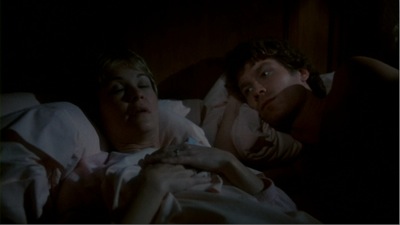
Vic (that is, Mr. Trenton) is no dummy however, and though he's suspicious, he plows ahead as if all is well. The fact that King chose to make Donna the philanderer has a great deal of significance throughout the film. Vic, while almost unfailing portrayed as a wonderful father and husband, is also cast as something of a wimp. As I mentioned above, he handles most of the traditional motherly roles and shares a close relationship with his son. That is not to say that Donna isn't motherly, but she is coded, if only through her bold sexual decisions (first to engage in an affair, and then to end it) as the more masculine of the two.
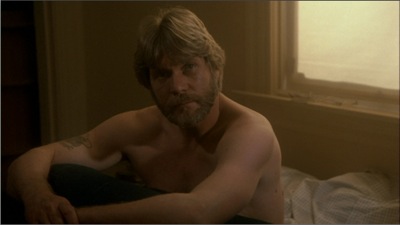
Conversely, Donna's lover Steve is portrayed as a virile man. It's made clear that he's something of a stud around the small community, and his appearance, with his shaggy beard and broad shoulders, leaves little to question about his masculinity. After Donna breaks off their tryst, Steve reacts rather poorly and even becomes violent, which lead to one of the more interesting visual elements crafted by Teague in the film.
There is a very clear line drawn between Steve and Cujo, and in many ways, Donna's interaction with Steve serves as a prelude to her showdown with the rabid dog. In a tense scene in act II, Steve breaks into the Trenton home while Donna is alone. He confronts her, and even goes so far as to indicate he plans to rape her, but she resists, and Steve must flee when Vic and Tad return. Here Teague plays the tension perfectly: he illustrates that Vic is aware of what has happened, wants to say something, but can't. The more masculine figure leaves with his tail between his legs, but really no worse for wear.
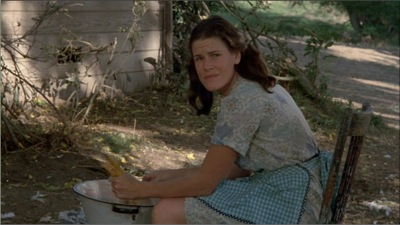
The Cambers are a whole other mess. We first meet them, when the mailman informs Vic that he should take his sports car to the Camber farm to be serviced. "Camber won't rob you blind," the mailman explains. The implication is that Mr. Camber, with his simple country existence, is somehow less corrupt than the town's mechanic. When the Trenton's arrive, Mrs. Camber sits shucking corn for supper. She offers them a drink while the men talk business. The image is idyllic. King stories love to play with this idea of townies and outsiders, of haves and have nots. On the outside, these families appear so different: one peaceful, the other in turmoil. But King has created two flawed existences.
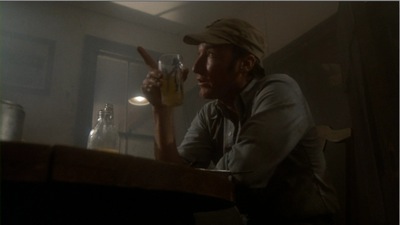
Mr. Camber, it turns out, isn't such an upstanding guy after all. The film doesn't give us a lot to work with, but Teague efficiently portrays the Camber patriarch as crass and unhappy. He's also mean, if not downright evil, to his family. The Mrs. gets a reprieve though, when she wins the lottery and announces that she wants to go visit her sister. In packing, she makes it quite clear however, that this trip is to be for good. Of course, that's likely fine by Mr. who, as we see above, is content to get boozy with his neighbor, and plans on heading to Boston (that mecca of depravity) to indulge in some, let's say, professional entertainment.
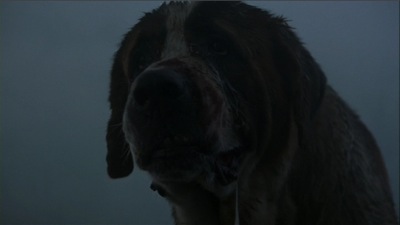
Into this whirlwind of shit steps Cujo. Much of the first half of "Cujo" plays like a family drama: there are relationships on the edge, children's lives hang in the balance, and someone is liable to get their feelings hurt! In horror though, as King knows well, that just won't do, and what better way to get everything straightened out than going a couple of rounds with a terrifyingly large, blood-thirsty animal.
Throughout the unfolding drama, Cujo's condition is shown worsening gradually. The dog quite literally becomes a repository for the negative emotions in the Camber household, and his fever grows as the relationships themselves progress to a boil. Cujo's favorite hiding spot, in the crawlspace beneath the house, can itself be read as a metaphor for the rotting insides that are masked by the Camber's pleasant exterior.
Just before Mrs. Camber leaves, the family's boy and best friend of Cujo encounters the beast in the mist. Here, Cujo is fully transformed, but doesn't attack the character who is without blame. Instead, once the wife is out of the picture, Mr. Camber and the neighbor are dispatched by Cujo in short order. It's already been established that Mrs. Camber had no intentions of ever returning to this abusive relationship, so the dog's rampage serves to wrap up the Camber's storyline quite neatly.
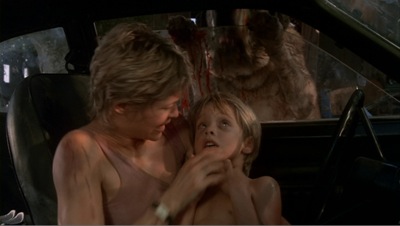
The Trenton's unfortunately don't get off so easy. With Vic away on an emergency business trip, Donna and Tad must travel to the Camber's to get her car fixed. Only, no one's home, except for a certain real monster. Donna's car stalls out, and the rest of the film consists of Tad and mom's brutal struggle to survive.
Though it's never spelled out, Donna and Tad cower in their stalled hatchback in the Camber's driveway for what appears to be several days. Vic is shown worrying, calling, and fretting from afar, but otherwise no one realizes the battle that has erupted between mother and monster. Having just recently decided to begin pulling her family back together, Donna is here put to the most extreme of motherhood tests.
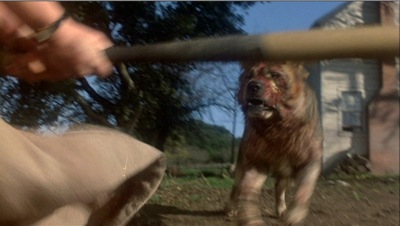
When things truly get desperate, with the sheriff having become collateral damage in the monster's drive to punish Donna, our heroine takes decisive action. Her love for her son has finally grown to overwhelm her desire to survive, so she escapes the car and takes up a bat (which, yes, we could read as a phallus). Teague pushes the conflict to the limit, but ultimately Cujo's over-aggression spells its own demise.
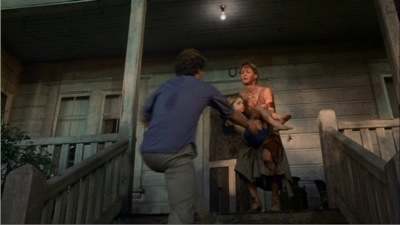
The final shot of the film shows Vic, reunited at last with his wife and child. He had been frantically struggling behind the scenes to help his family, and he's allowed to gain some semblance of masculinity through sheer force of will in his effort. What's important though is that order—loving mother, loving father, and healthy son—has been restored. Not only has the family survived, but they are stronger for having experienced their ordeal, and we the audience can feel comfortable knowing that they will be better for it.
In a lot of ways, "Cujo" is one of King's more simple stories, and while it may not be the most memorable of the Decade Long Stephen King Cinematic Orgy, it is an effective and enjoyable film. The filmmakers did an excellent job of distilling down the essential elements of the original story, and crafting a film that stays true in spirit while also becoming a fine cultural product in its own right. I'd like to make special note of Lewis Teague's direction, which was surprisingly strong. Looking at his IMDB page, it's a shame to find that he hasn't had a lot of chances in Hollywood. Though I haven't seen it, from what I hear, Teague's "Alligator" is an under-appreciated cult film. The man may not have the cache of some of the big names to have worked with King's material, but he proved very capable of doing justice to the horror master.

